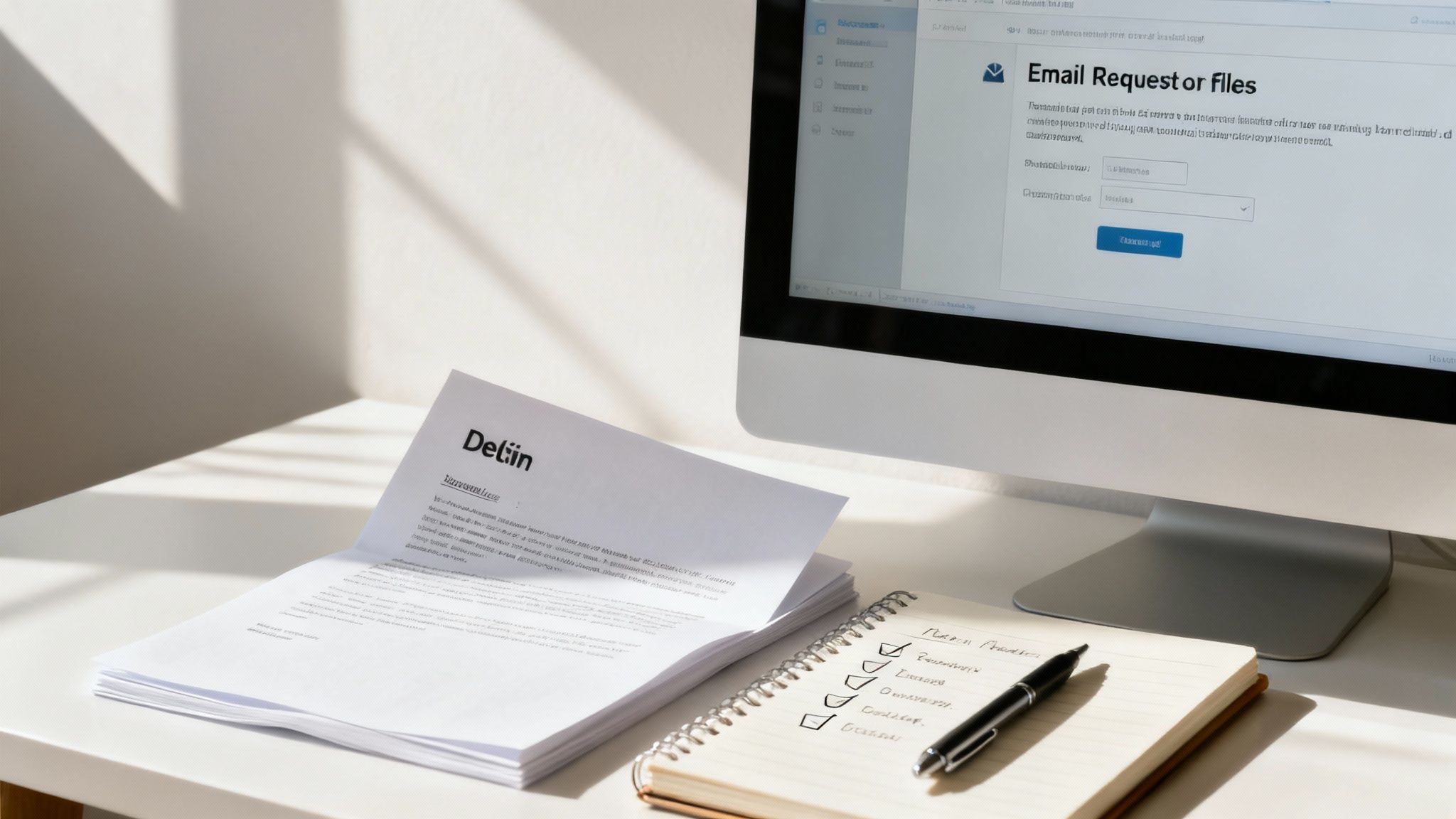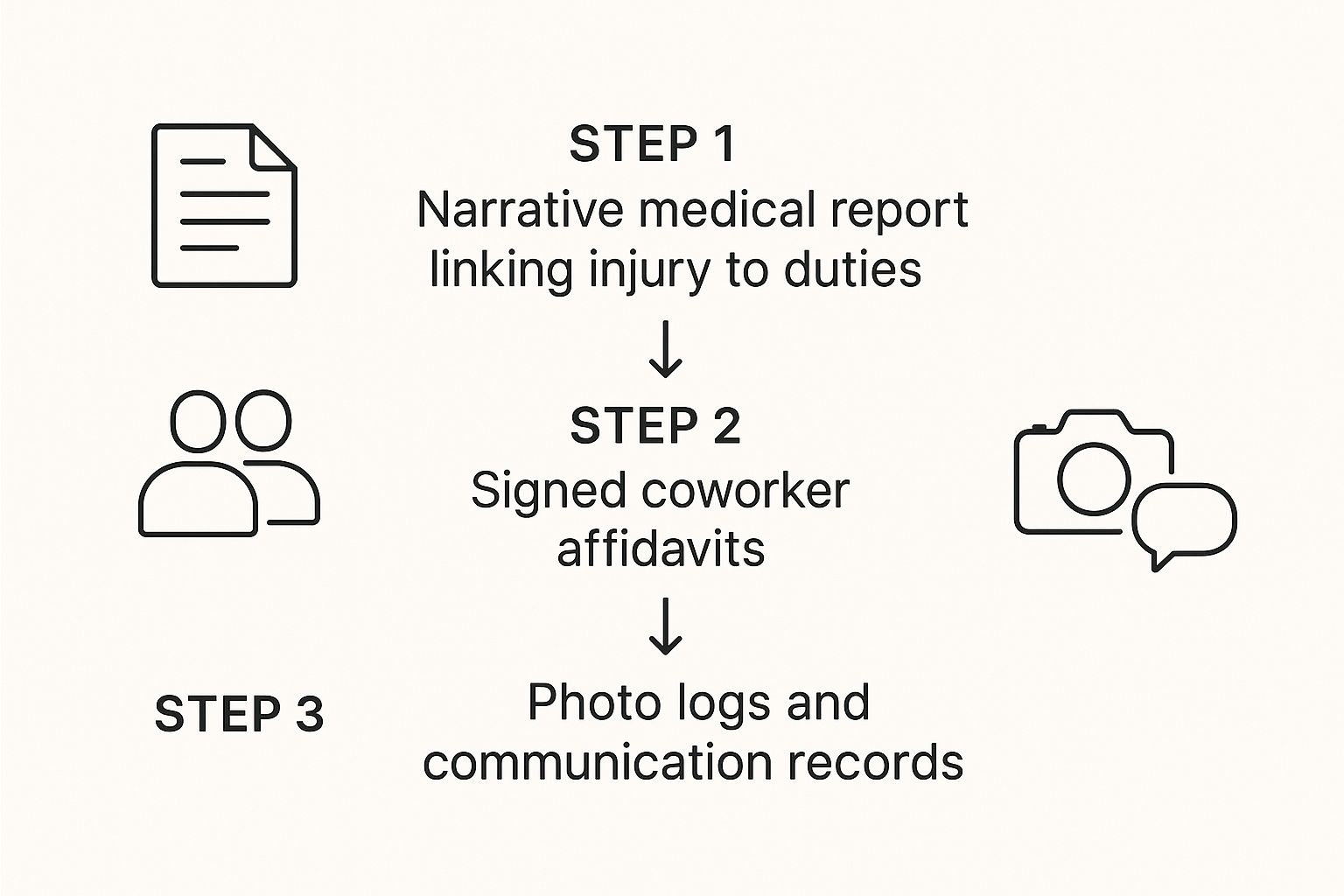How to Appeal Workers Comp Denial: Proven Steps to Win
"I was satisfied once John Bell took over my case."
"Communication was always timely."
How to Appeal Workers Comp Denial: Proven Steps to Win
Getting that denial letter in the mail can feel like a punch to the gut. It's frustrating, disheartening, and often feels deeply unfair. But before you let the anger or anxiety take over, take a deep breath. That letter isn't the end of the road; it's actually the starting point for your appeal.
The insurance company has to give a specific reason for denying your claim. Your first and most important job is to dig into that letter and understand exactly what their argument is. This is the key to building a strong case to overturn their decision.
Understanding Why Your Workers Comp Claim Was Denied

Think of the denial letter as the insurer's opening statement. They've laid out their case for why they believe they shouldn't have to cover your injury. Now, it's your turn to prepare a rebuttal. By dissecting their reasoning point by point, you can gather the precise evidence needed to prove them wrong.
Instead of fighting a vague "denied" stamp, you'll be directly challenging their specific claims, which is a much more effective strategy.
Common Triggers for a Denial
Insurers tend to lean on a few common reasons when rejecting a claim. While about 7% of claims are denied nationally, that number can be as high as 12% in Oregon, so it's a frequent hurdle for injured workers.
Here are some of the most common justifications you’re likely to see pop up in that letter:
- Disputes Over Work-Relatedness: The insurer might claim your injury didn't actually happen on the job or wasn't caused by your work duties. This is a classic argument, especially for injuries that develop over time, like carpal tunnel or chronic back pain.
- Pre-Existing Conditions: This is a big one. They'll often argue that an old injury or an underlying health issue is the real source of your pain, not the recent incident at work.
- Procedural Errors: Sometimes, it’s about simple paperwork. Missing the deadline to report your injury or file your claim can trigger an automatic denial, even if the injury itself is legitimate.
The insurer's denial letter is not the final word; it is their opening argument. Your job is to systematically dismantle that argument with facts, medical evidence, and a clear timeline of events.
Insurance companies often deny claims for predictable reasons. Understanding these common tactics can help you anticipate their arguments and prepare a solid response.
Common Reasons for Workers Comp Denial
| Injury Not Work-Related | The insurer believes your injury happened outside of work or isn't a direct result of your job duties. | Gather witness statements, work logs, or doctor's notes that create a clear timeline connecting your injury to a specific work event or activity. |
| Pre-Existing Condition | They claim a previous injury or underlying condition is the primary cause of your current medical problems. | Ask your treating physician for a detailed medical opinion explaining how the work incident specifically worsened or aggravated the pre-existing condition. |
| Missed Deadlines | You didn't report the injury to your employer or file your claim within the legally required timeframes. | Document any reasons for the delay. Did your supervisor tell you to wait? Were you incapacitated? Collect evidence to justify the late filing. |
| Insufficient Medical Evidence | The medical records submitted don't provide enough detail to support a work-related injury. | Work with your doctor to provide a more comprehensive report, including diagnostic results (MRIs, X-rays) and a clear medical nexus letter. |
By identifying which category your denial falls into, you can focus your efforts where they'll have the most impact.
Scenarios You Might Encounter
Let's make this real. Imagine you hurt your back lifting a heavy crate at work. The insurance company denies your claim, saying their doctor reviewed your file and thinks it's just a flare-up of pre-existing arthritis. To fight this, your goal is to get a detailed report from your doctor clearly explaining how the lifting incident caused a new injury, distinct from the underlying arthritis.
Here’s another common one: you tweaked your wrist but your boss told you to "walk it off and see how it feels tomorrow." You wait a few weeks, the pain gets worse, and by the time you report it, you’ve missed the 30-day reporting window. In your appeal, you'd focus on proving that conversation happened. A statement from a coworker who overheard it could be exactly what you need to show you had a valid reason for the delay.
Getting a handle on the insurer's specific objection is everything. Once you know their angle, you can learn the specific steps of the Oregon workers comp claim process and start building a powerful, evidence-based appeal.
What to Do the Moment a Denial Letter Arrives

When that denial letter shows up in your mailbox, it’s easy to feel defeated. But don't let it paralyze you. The moment it arrives, an invisible clock starts ticking.
In Oregon, you generally have just 60 days from the date the letter was mailed to file your appeal. What you do in these first few days and weeks is absolutely crucial for protecting your rights and building a strong case.
Your first move is to dissect the letter itself. Don't just skim it. Read every single line to find the insurer's official reason for the denial. Are they saying your injury isn't work-related? Questioning the medical evidence? Claiming you missed a key deadline? This reason is the very foundation of their argument, and you need to understand it inside and out to build your counter-argument.
Become an Investigator: Gather Your Evidence
Once you know why they denied your claim, it's time to go on the offensive. Your next step is to formally request a complete copy of your claim file from the insurance company. This isn't just a good idea—it's a non-negotiable part of learning how to appeal workers comp denial successfully.
Make sure you submit this request in writing. This creates a paper trail and holds them accountable.
Think of this file as the insurer's playbook. It contains every single piece of evidence they used to make their decision, giving you an insider's view of their case against you.
Once you have the file, you’ll want to hunt for the documents that can expose the weak spots in their argument:
- Independent Medical Examination (IME) Reports: This is the report from the doctor the insurance company hired to examine you. Scour it for inconsistencies, factual errors, or any conclusions that directly contradict what your own doctor has said.
- Internal Adjuster Notes: These notes are a goldmine. They can reveal the adjuster’s thought process, internal biases, or flawed logic that led to the denial.
- Witness Interviews: Did the insurer talk to your coworkers or manager? Their statements are in the file. You need to know exactly what was said, whether it helps or hurts your case.
Getting your claim file isn't just about collecting paperwork. It's about leveling the playing field. It arms you with the exact same information the insurance company is using, so there are no surprises.
It's shocking how often claims are denied for simple procedural reasons. Missing a deadline or filing in the wrong place can sink a perfectly valid claim before it even gets off the ground.
For instance, a study on World Trade Center workers' comp claims revealed that procedural errors were a massive problem. Nearly 60% of denials came from filing in the wrong jurisdiction, and over 20% were due to untimely filing. While your Oregon case is different, this highlights just how critical it is to get the details right from day one. You can learn more about these complex denial patterns in WTC claims.
Building Your Case with Compelling Evidence
Winning an appeal isn’t about making a passionate argument; it's about backing it up with undeniable proof. Your goal is to construct a case so solid that it systematically picks apart the insurance company's reason for denying your claim. This means you need to go way beyond a simple doctor's note and pull together a file that tells the complete story of your injury.
The absolute foundation of your appeal is your medical documentation. Vague notes from your doctor just won’t cut it—they’re too easy for an insurer to dismiss. What you really need is a strong narrative medical report from your physician. This isn't just a summary of your appointments; it’s a detailed, professional opinion that clearly and directly links your injury to your work duties. In legal terms, this is called "medical causation."
Let's say the insurance company argues your back injury is just from pre-existing arthritis. A powerful narrative report from your doctor would explain exactly how lifting that 50-pound box at work caused a new herniated disc, making a previously manageable condition acutely painful and disabling. Building this medical file is key, and it often comes down to the details in the records, like the diagnostic codes. While you don't need to be an expert, understanding ICD-10 codes can give you a better grasp of how your injury is being documented.
Beyond the Doctor’s Office
Your medical records are the main event, but other evidence provides the essential supporting cast. This is where you bring the facts to life and add context that a medical chart can't capture. Think of it as painting a complete picture for the judge, leaving no doubt about what really happened.
Here are some of the most impactful pieces of non-medical evidence you can gather:
- Signed Coworker Affidavits: Getting written, signed statements from colleagues who saw the accident or know about your struggles can be incredibly powerful. A simple affidavit from a coworker who saw you fall or heard you immediately tell your manager about the pain adds a layer of credibility that an insurance adjuster can't easily ignore.
- Photos and Videos: Did an unsafe condition cause your injury? A wet floor without a warning sign? A broken ladder? A cluttered walkway? Pull out your phone and take pictures. Visual proof is often the most compelling evidence you can present.
- Communication Logs: Keep a running log of every single phone call, email, and conversation you have with your employer and the insurance company. Write down the date, time, who you spoke with, and a summary of the discussion. This can be a lifesaver if their story starts changing later on.
This infographic breaks down the key elements that form a strong workers' compensation appeal.

As you can see, it's the combination of both medical and real-world evidence that truly makes a case persuasive.
Assembling Your Evidence File
Just gathering the evidence isn't enough; you have to organize it. Start a dedicated folder—either a physical one or a digital one on your computer—and keep everything in one place. You’ll need to refer back to these documents constantly throughout the appeal. If you're not sure where to begin with your medical charts, our guide explains in detail https://www.belllawoffices.com/how-to-get-medical-records/.
Keep this in mind: the burden of proof is now on you. The insurance company has already said "no." It's your job to show them—and a judge—overwhelming evidence that they got it wrong.
By carefully collecting and organizing every piece of the puzzle—medical reports, witness statements, photos, and emails—you're doing more than just disagreeing with a denial. You're building a well-documented legal challenge that gives you the best possible shot at getting that decision overturned.
So, You're Appealing Your Workers' Comp Denial. What Happens Next?
The moment you decide to fight a denial, you’re not just having a disagreement with an insurance adjuster anymore. You've officially entered a formal legal process with its own set of rules, deadlines, and key players. Knowing the lay of the land is the first step to successfully navigating the Oregon workers' comp system.
Your journey begins with a crucial document: the Request for Hearing (Form 2838). This is what you file with the Oregon Workers' Compensation Board to officially kick off your appeal. It's vital to fill this out completely and accurately, as any little mistake could cause frustrating delays.
You’re on the clock, too. There’s a strict 60-day deadline from the date printed on your denial letter to get this form filed. Don't wait.
Getting the Ball Rolling: The First Steps
Once your Request for Hearing is in, your case gets handed over to an Administrative Law Judge, or ALJ. Think of the ALJ as the neutral referee who will hear both sides and make the final call on your appeal.
Soon after, you’ll probably have a scheduling conference. This is usually just a phone call between you (and your attorney, if you have one), the insurer's lawyer, and the ALJ to map out the important dates for your case. It’s not the hearing itself, but more of a planning session.
Then comes the "discovery" phase. This is the part where everyone lays their cards on the table. You'll share your medical records and a list of anyone who will testify for you, and in return, the insurance company has to give you everything they have in their file. This includes the very medical reports they used to justify denying your claim in the first place.
Discovery is all about transparency. The goal is to avoid any "gotcha" moments at the hearing. Both sides get a complete picture of the evidence, which allows for a fair fight based on the facts.
This is why getting your documents in order early is so important. The discovery phase is a strategic back-and-forth that really sets the stage for the hearing.
Who's Who in the Hearing Room
Walking into a legal proceeding can feel intimidating, but it helps to know who you'll be dealing with. For the most part, you'll be interacting with three main people:
- The Administrative Law Judge (ALJ): This is the impartial decision-maker. They run the hearing, listen to all the testimony, look at the evidence, and issue the final ruling on whether to approve or deny your appeal.
- Your Attorney: If you've hired a lawyer, they are your champion. They'll handle the paperwork, keep track of deadlines, question witnesses, and build and present your case to the ALJ.
- The Insurer's Attorney: The insurance company brings their own lawyer to the fight. Their entire job is to defend the denial, which means they’ll cross-examine you and your witnesses and present evidence to back up their decision.
Understanding these roles demystifies the process. It's a structured system, moving methodically from that initial request form to a full exchange of evidence, all before the final arguments are heard. This ensures that every piece of information gets a thorough look before a decision is made.
Preparing for Your Workers Compensation Hearing

The hearing is where everything you've worked for comes to a head. It's your one real chance to state your case directly to an Administrative Law Judge (ALJ), the impartial official who has the authority to reverse the insurer's denial. How you prepare and present yourself can genuinely make or break your appeal.
Don't mistake this for an informal chat. It's a formal legal proceeding, and you need to treat it that way. Dress professionally, show up early, and be respectful to everyone involved. The room itself is set up like a small courtroom, with the ALJ presiding and separate tables for you (and your attorney) and the insurance company’s lawyer. Your credibility is on the line, and staying calm, clear, and honest, especially under questioning, is paramount.
Mastering Your Testimony
Your testimony is the bedrock of your case. You absolutely must know the details of your injury, medical treatments, and work history inside and out before you step into that room. The insurer’s attorney will cross-examine you, specifically looking for any inconsistencies or holes in your story.
Practice recounting your experience chronologically and clearly. Your story should have three unshakable pillars:
- The Injury Itself: Describe exactly how the injury occurred. Stick to the facts without embellishment.
- Your Medical Experience: Detail your symptoms, what treatments you’ve received, and how the injury has impacted your day-to-day life.
- Your Work Limitations: Explain precisely how your injury prevents you from doing your job. What specific tasks can you no longer perform?
The goal is to be truthful and consistent, not overly emotional. Listen carefully to each question and answer only what is asked—don't offer up extra information. If you don’t know an answer, it's far better to simply say, "I don't know."
The Power of Supporting Witnesses
You don't have to go it alone. Strong supporting witnesses can provide powerful, independent validation of your claim. For instance, a coworker who witnessed the accident can corroborate how it happened. A medical expert, such as your own doctor, can provide a professional opinion that directly connects your injury to your work duties.
Their testimony adds an essential layer of proof that’s much harder for the insurer to refute. It elevates your case from your word against theirs to a fact-based account backed by credible sources.
A well-prepared witness can be the key to corroborating your story. Their objective perspective can reinforce the facts and lend significant weight to your appeal, making your case much more compelling for the judge.
Figuring out when to hire a workers comp lawyer is crucial because a good attorney knows exactly how to prepare you and your witnesses for testimony, ensuring your case is presented in the strongest light possible.
While it might feel like an uphill battle, the statistics offer some hope. Roughly 50-65% of initially denied claims that are appealed ultimately result in the worker receiving some form of benefits. More importantly, having experienced legal representation on your side can significantly boost those odds. You can find more information about the chances of winning a workers comp appeal on timwelborn.com.
The weeks leading up to the hearing are for meticulous preparation. This checklist can help you stay organized and ensure you haven't missed any critical steps.
Hearing Preparation Checklist
| Review All Medical Records | You need to know your treatment history, dates, and doctor's recommendations perfectly. | ☐ In Progress / ☐ Complete |
| Practice Your Testimony | Rehearse telling your story out loud to ensure it's clear, consistent, and concise. | ☐ In Progress / ☐ Complete |
| Confirm Witness Availability | Contact your witnesses to confirm they can attend and briefly review their expected testimony. | ☐ In Progress / ☐ Complete |
| Gather All Evidence | Organize your documents (medical bills, reports, etc.) so they are easy to access. | ☐ In Progress / ☐ Complete |
| Prepare Questions for Witnesses | If you have an attorney, they will handle this, but it's good to know what will be asked. | ☐ In Progress / ☐ Complete |
| Plan Your Hearing Day Logistics | Know the location, parking, and how long it takes to get there. Plan to arrive early. | ☐ In Progress / ☐ Complete |
Completing this checklist doesn't just get you organized; it builds your confidence, which is something the judge will notice on hearing day.
Got Questions About Appealing a Denial? Let's Get Them Answered.
When you're facing a denial, the path forward can seem confusing and full of questions. That’s completely normal. Getting solid, straight-up answers is the first step toward feeling in control and ready to fight for the benefits you deserve.
Let's dive into the biggest concerns I hear from injured workers in Oregon when they decide it's time to challenge the insurance company's decision.
How Long Do I Really Have to File an Appeal?
This is the most critical question, and the answer is not flexible. In Oregon, you have a strict 60-day window to file your Request for Hearing, starting from the date your denial letter was mailed.
Don't cut it close. I’ve seen people miss this deadline by a day and lose their right to appeal entirely. Circle the date on your calendar, but plan to file well before that 60-day mark hits. This gives you a buffer against any unexpected mail delays or processing hiccups.
Can I Handle a Workers' Comp Appeal Without a Lawyer?
Technically, yes, you can represent yourself. But I have to be blunt: it's a massive gamble. The insurance company isn't sending a rookie to the hearing; they're sending a seasoned lawyer whose entire job is to poke holes in your case and uphold that denial.
Time and again, the data shows that injured workers with legal representation have a much, much higher success rate. A good attorney doesn't just know the law; they understand the system's quirks, know how to build a compelling case with medical evidence, and can anticipate and counter the insurer's tactics.
While the specifics vary, the core ideas of preparing an appeal are similar across different systems. You can get a general sense of the process from this a step-by-step guide on how to appeal a decision, which highlights universal concepts of challenging an official ruling.
Here's the bottom line: The insurance company has a professional in their corner. Shouldn't you? Going it alone puts you at a severe disadvantage from the very start.
What Happens If the Judge Rules Against Me at My Hearing?
Losing your hearing with the Administrative Law Judge (ALJ) is a setback, but it’s not necessarily the end of your fight. You still have more moves to make, though the game definitely gets tougher from here.
- First, you can appeal to the Workers' Compensation Board. This isn't another hearing. Instead, it's a review of the record where your attorney submits a detailed legal argument explaining why the ALJ's decision was wrong.
- Next, you can appeal to the Oregon Court of Appeals. If the Board doesn't side with you, this is your final option. This level involves even more complex legal procedures and strict deadlines.
At each of these higher stages, having an experienced lawyer isn't just a good idea—it's absolutely essential to have any real chance of success.
If you're facing a workers' comp denial, you don't have to navigate the confusing appeals process alone. The experienced team at Bell Law is here to fight for your rights and help you secure the benefits you are owed. Contact us for a consultation today. https://www.belllawoffices.com
Disclaimer: The information on this page is provided for general informational purposes only and is not legal advice. Reading this content does not create an attorney-client relationship. For advice about your specific situation, please contact a licensed attorney.







